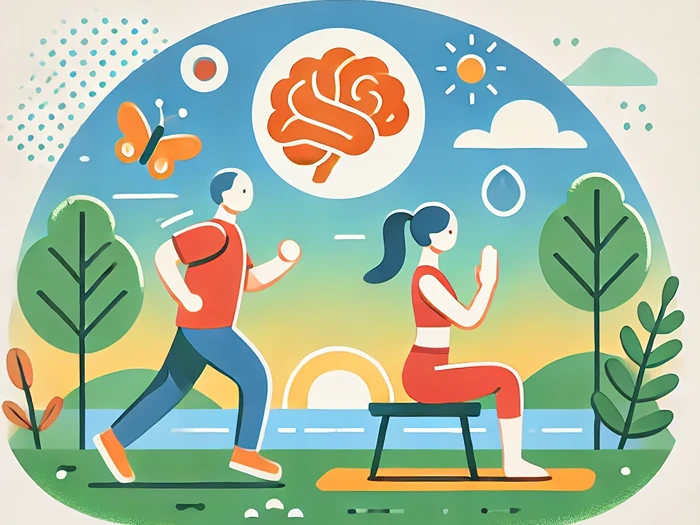
Mind-Body Connection: How to Achieve Balance and Harmony
The mind-body connection is a powerful and complex relationship between our mental and physical health. It’s not just a concept; it’s a reality that influences how we feel, think, and even how our body heals. When we achieve balance and harmony between the mind and body, we open the door to improved well-being and overall health. In this article, we’ll explore how this connection works, why it’s essential, and how you can harness it to live a more balanced and harmonious life.
What Is the Mind-Body Connection?
The mind-body connection refers to the link between our thoughts, emotions, and physical health. It’s the idea that our mental state can directly affect our physical condition and vice versa. This connection has been recognized for centuries, with ancient practices like meditation, yoga, and holistic healing emphasizing the importance of maintaining a balance between mind and body.
Research has shown that stress, anxiety, and negative emotions can lead to physical ailments like headaches, digestive issues, and even chronic illnesses. On the other hand, positive mental states, such as happiness and contentment, can boost our immune system and promote healing. Understanding this connection allows us to take control of our health by focusing on both mental and physical wellness.

How Stress Affects the Mind-Body Connection
Stress is one of the most significant disruptors of the mind-body connection. When we’re stressed, our body releases cortisol, a hormone that prepares us for ‘fight or flight.’ While this response is useful in short bursts, chronic stress keeps cortisol levels high, leading to various health issues like high blood pressure, weakened immune function, and mental health disorders.
By understanding the impact of stress on our body and mind, we can take steps to manage it. Techniques like deep breathing, meditation, and regular physical activity are effective ways to reduce stress and restore the balance between the mind and body.
Helpful Hint:
Incorporate mindfulness practices into your daily routine to help manage stress. Even a few minutes of deep breathing or meditation each day can significantly reduce stress levels and strengthen the mind-body connection.
Physical Exercise: A Key Component of the Mind-Body Connection
Physical activity plays a crucial role in maintaining the mind-body connection. Exercise not only strengthens the body but also has a profound impact on mental health. Regular physical activity releases endorphins, often referred to as ‘feel-good’ hormones, which can reduce stress, anxiety, and depression.
Moreover, exercise promotes better sleep, improves cognitive function, and boosts self-esteem. Whether it’s a gentle yoga session, a brisk walk, or a vigorous workout, incorporating regular exercise into your routine is essential for achieving balance and harmony between your mind and body.
Stats:
A study published in the Journal of Sports Medicine found that individuals who engage in regular physical activity experience a 20-30% reduction in symptoms of depression and anxiety, highlighting the importance of exercise in the mind-body connection.
Key Mind-Body Practices and Their Benefits
| Practice | Benefits |
|---|---|
| Mindfulness Meditation | Reduces stress, improves focus, enhances emotional regulation. |
| Regular Exercise | Boosts mood, improves sleep, strengthens the immune system. |
| Balanced Nutrition | Supports brain function, stabilizes mood, reduces inflammation. |
| Quality Sleep | Promotes mental clarity, aids in physical recovery, balances hormones. |
| Aromatherapy | Enhances mood, reduces anxiety, improves sleep quality. |
| Yoga | Increases flexibility, reduces stress, balances energy. |
Nutrition and the Mind-Body Connection
What we eat has a direct impact on our mental and physical health. A balanced diet rich in nutrients supports brain function, boosts mood, and helps maintain physical health. On the other hand, a diet high in processed foods, sugar, and unhealthy fats can lead to mood swings, fatigue, and physical ailments.
Incorporating whole foods like fruits, vegetables, lean proteins, and healthy fats into your diet can enhance the mind-body connection. These foods provide the essential nutrients that support brain health, reduce inflammation, and promote overall well-being. Paying attention to what you eat and how it makes you feel is a vital step in achieving balance and harmony between mind and body.
Mindfulness and Meditation: Strengthening the Mind-Body Connection
Mindfulness and meditation are practices that help us focus on the present moment, reducing stress and enhancing the mind-body connection. These practices have been shown to lower cortisol levels, improve emotional regulation, and even change the structure of the brain in ways that promote mental health.
By regularly practicing mindfulness or meditation, we can develop greater awareness of our thoughts and feelings, allowing us to respond to stress more effectively. This, in turn, helps to maintain a healthy balance between the mind and body, leading to greater harmony and well-being.
Helpful Hint:
Start your day with a few minutes of mindfulness meditation. Focus on your breath and observe your thoughts without judgment. This simple practice can set a positive tone for the day and strengthen your mind-body connection.
Sleep: The Unsung Hero of the Mind-Body Connection
Sleep is often overlooked in discussions about health, but it’s a critical component of the mind-body connection. During sleep, our body repairs itself, and our brain processes emotions and memories. Lack of sleep can disrupt this process, leading to both mental and physical health issues.
Ensuring you get enough quality sleep each night is essential for maintaining balance and harmony between your mind and body. Establishing a regular sleep routine, creating a restful environment, and avoiding stimulants before bed can help improve sleep quality and, in turn, enhance the mind-body connection.
Stats:
According to the National Sleep Foundation, adults who get 7-9 hours of sleep per night are 30% more likely to maintain a healthy weight and report better mental health compared to those who sleep less.
Holistic Practices to Enhance the Mind-Body Connection
Holistic practices like acupuncture, massage therapy, and aromatherapy can further enhance the mind-body connection. These practices work by promoting relaxation, reducing stress, and encouraging the flow of energy throughout the body. When used alongside other mind-body techniques, they can provide additional support in achieving balance and harmony.
For example, acupuncture has been shown to release endorphins and promote relaxation, while aromatherapy can trigger emotional responses that reduce stress and enhance mood. Incorporating these practices into your routine can create a more profound connection between your mind and body.
FAQs
Wrapping Up
The mind-body connection is an essential aspect of achieving overall health and well-being. By understanding how our thoughts, emotions, and physical health are intertwined, we can take proactive steps to create a balanced and harmonious life. Incorporating practices like mindfulness, exercise, proper nutrition, and holistic therapies strengthens this connection, leading to improved mental clarity, reduced stress, and better physical health.
As you continue your journey towards balance and harmony, remember that small, consistent changes can make a significant impact. Focus on nurturing both your mind and body, and you’ll find yourself on a path to a healthier, more fulfilling life. Keep exploring and experimenting with different practices to discover what works best for you, and continue to prioritize your well-being.
